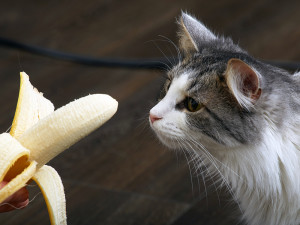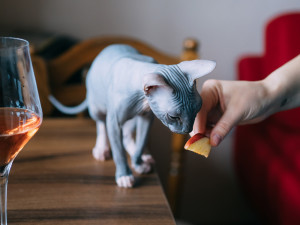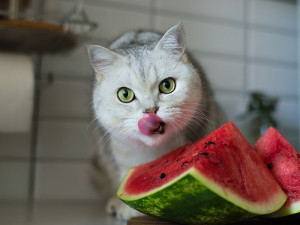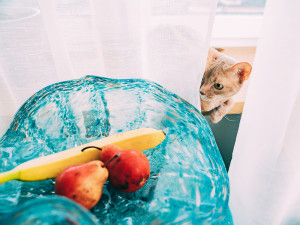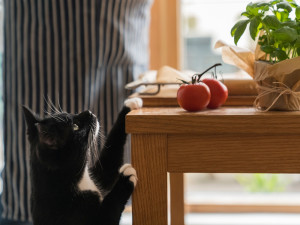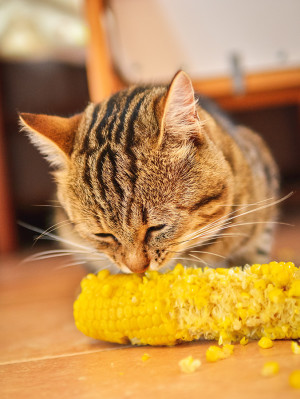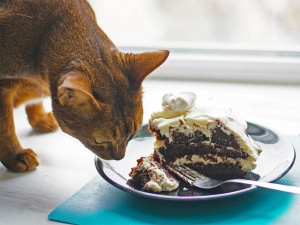Can Cats Eat Mango?
It is the perfect healthy treat for you, but what about them?
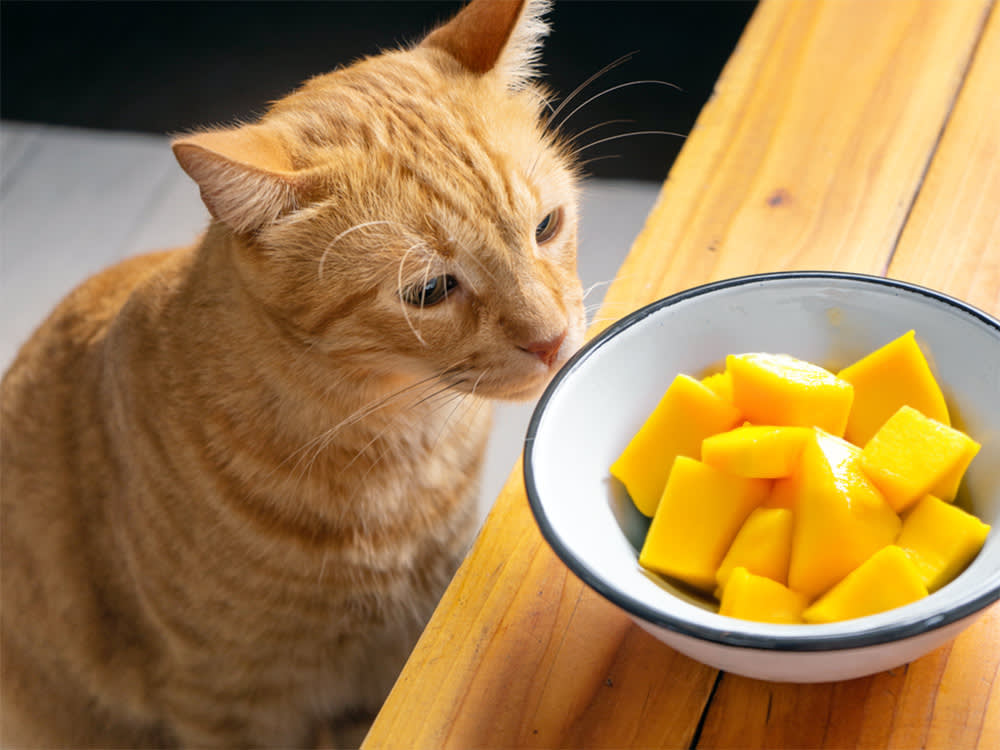
Share Article
Mangos are not only delicious but boasts many amazing health benefits, so you may be wondering if you can share some mango with your cat. While, yes, you can share small bits of mango with them, it is important to keep this to a minimum to avoid any unwanted effects.
Because cats are obligate carnivores, they have very specific nutritional requirements, which means the bulk of their diet needs to be a complete and balanced cat food diet that is high in protein and fats. Read on to learn more about feeding mangos to your cat.
Nutrition facts about mango for cats
Mangos are the fruit of the Mangifera indica tree, a plant in the family of Anacardiaceae, which also includes cashews, pistachios, and some of the black sheep of the family, poison oak, poison sumac, and poison ivy. These delicious fruits grow in tropical climates and are known for their sweet golden flesh.
All parts of the fruit and tree have also been used in traditional medicine to treat different ailments. Mangos contain lots of important vitamins, minerals, fiber and sugar, in addition to being a great source of antioxidants.
Are mangos good for cats?
Despite their many healthy attributes, mangos are not actually good for cats. The main reason for this is that mangos contain a lot of sugar and do not provide many of the critical nutrients cats really need. It is safe in small amounts, however, and can provide some benefits including:
Fiber: Fiber is a form of carbohydrate that is not digestible but has many benefits for digestive health. Mangos contain both soluble and insoluble fiber so they can help to bulk up the stool and prevent constipation and also provide important nutrients for the gut microbiome. Fiber can also help cats to feel full without adding additional calories to their diet, which is a helpful strategy for cats who are overweight.
Vitamins and minerals: Mangos are chock full of important vitamins and minerals. They are often celebrated for their vitamin C content, however cats actually do not need to get vitamin C from their food like people as they can synthesize it themselves. Cats can benefit from other nutrients in mangoes including vitamin A, vitamin E, vitamin B9 (folate), vitamin B6 (pyridoxine), vitamin K, magnesium, potassium, and copper.
Antioxidants: Mangos contain potent antioxidants, which have many potential benefits in the body. Specifically, mangos contain a compound known as mangiferin, which is being studied for its possible anti-cancer, antiviral, and anti-aging properties.
Can cats eat mango skin?
Cats should not eat mango skin for a few reasons. First, it is very fibrous and can be difficult to chew and digest, leading to possible choking hazards and digestive upset including vomiting and/or diarrhea.
Also, the mango skin can cause irritation to the skin, known as mango dermatitis. This is an allergic reaction to a compound called urushiol, which is also present in poison ivy and poison oak, relatives of the mango tree. The reaction does not happen to everyone who touches the skin but can be unpredictable. No specific reports of this condition have been documented in cats, so it is unknown if they are as sensitive to it as humans. It is best to play it safe and avoid giving mango skin to your cat.
Are mangos completely safe for cats?
While the fruit of the mango is non-toxic for cats, there are many reasons to limit how much mango you share with your cat:
High-sugar content: Mangos are high in sugar, specifically containing lots of fructose. As obligate carnivores, cats cannot process fructose the way that we do and they are at an increased risk for weight gain and diabetes when they consume a lot of sugar.
High-fiber content: While fiber has many health benefits, it can also cause digestive upset when too much is ingested, especially in cats that are not accustomed to it. It is best to start slow and offer very small amounts of fibrous foods gradually to see how your cat tolerates it.
Urushiol: This compound is found in the mango skin and is also found in poison ivy and poison oak. It can cause skin irritation in people who are sensitive to it and may also have a similar effect on some cats. Try to keep the skin out of reach of your cat and monitor closely for signs of skin irritation if they do chew on it.
The bottom line: Can cats eat human food?
Cats can eat some human foods, but it’s important to select options that are safe and healthy for your cat. Cats have specific nutritional requirements and cannot metabolize the same wide variety of foods as omnivores. For this reason, cats really need a complete and balanced cat food diet as their primary source of nutrients. The occasional snack of table food is OK, as long as it is a food that is safe for cats and makes up less than 10 percent of your cat’s total intake.
As carnivores, cats tend to process protein and fats better than carbohydrates and sugars, so if you are interested in sharing foods with your cat, try to choose plain, lean proteins, and avoid foods that are high in starches, carbohydrates and sugars. Always double-check that the food you are offering is non-toxic. Some common human foods are toxic to cats. If in doubt, check with your vet or a pet-poison hotline before offering your cat something new.
Other foods that are safe for cats
Tuna and other fish can be safe in moderation.
Ham can be shared as the occasional snack with a few caveats.
Berries that are lower in sugar, like blueberries, raspberries, or strawberries can be a better choice for the occasional treat.
Other foods that are dangerous for cats
Garlic can cause a life-threatening anemia in cats.
Chocolate and these other foods are also toxic to cats.
Grapes and raisins are also off-limits.
FAQs (People also ask)
How much mango can a cat eat?
Cats should only eat very small amounts of mango since it is high in sugar and all snacks should be less than ten percent of a cat’s total diet.
Is it OK to give cats mango?
It is ok to share a small bite or two of mango with your cat as it is not toxic but is high in sugar which cats cannot metabolize.
Why do cats like mangos?
They may be attracted to the sweet smell and juice texture of mango.
Can cats eat mango skin?
They should not eat the skin because it is very fibrous and hard to chew, plus it contains a compound that can be irritating to the skin.
Are mangos safe for cats?
In small amounts, the flesh of the mango fruit is safe for cats.
References:
Cleveland Clinic: Mango-licious the Top 6 Health Benefits of Mangoopens in new tab
Pharmacognosy Review: Mangifera indica (Mango)opens in new tab

Dr. Amy Fox, DVM
Amy Fox, DVM is a small animal veterinarian in New York City. A lifelong animal lover, Dr. Fox studied biology in college and then worked as a veterinary nurse before pursuing veterinary school at Cornell University. She has worked in many different settings including shelter medicine, emergency medicine, general practice, and animal cruelty and forensics. She is especially interested in nutrition, preventative medicine and care for senior pets. Dr. Fox also enjoys writing about veterinary medicine and teaching. In her free time she loves to cook, garden, and go for long runs.
Related articles
![Cat behind a curtain attempting to get fruit in blue bowl]()
What Fruits and Veggies Can Your Cat Feast On?
Pass the fruit bowl — it’s treat time.
Can Cats Eat Carrots?
Learn whether your little Bugs Bunny can crunch on the veggie.
![Domestic Black Cat Begging for Tomatoes.]()
Can Cats Eat Tomatoes?
A little tomato’s safe — with some important caveats.
![a woman eats breakfast with pomegranate while her cat sits on her lap]()
Can Cats Eat Pomegranates?
Vets want them to steer clear. Here’s why.
![an orange and brown cat nibbles corn on the cob]()
Can Cats Eat Corn?
A few kernels won’t hurt, but think twice before doling out a bowl of the stuff.
Can Cats Eat Chocolate?
No, no, no. Absolutely not. Here’s why.

